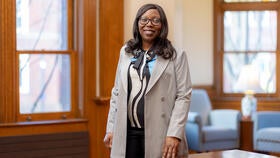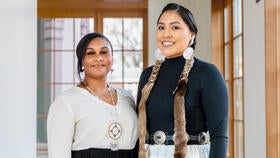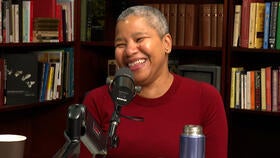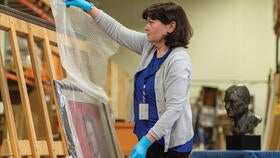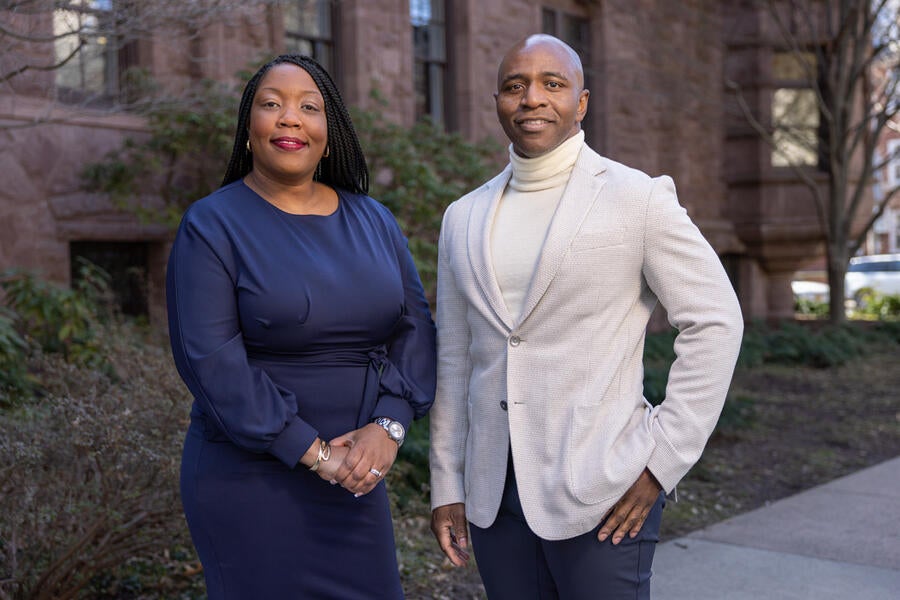
Yale is well-known as a veteran-friendly campus — for students in the university’s Naval and Air Force ROTC programs, those returning to their studies after military service, and for employees who are veterans, reservists, and members of the National Guard. One key resource can be found in the Yale Veterans Network (YVN), which primarily serves faculty and staff but also welcomes students. Established in 2013, the group supports veterans and allies through community engagement and career development.
Yale’s affinity groups are supported by the Office of Diversity and Inclusion, under the leadership of Deborah Stanley-McAulay, associate vice president of employee engagement and workplace culture. This is the second in a series of interviews with affinity group leaders, volunteers who are chosen by their peers for two-year terms. The first installment introduced the co-chairs of the Working Women’s Network.
“I came to Yale because of the YVN,” says YVN co-chair Rod Lowe, who joined Yale in 2021 as a senior associate director for major gifts at Yale Divinity School after serving as an officer in the U.S. Army. He describes himself as a “non-traditional” veteran, having worked in marketing and development for many years before enlisting, when he was 28.
Tamika Hollis had a more indirect route to YVN. A community engagement project manager at the Yale School of Medicine, she has worked at Yale for 25 years. She joined YVN in 2015 after realizing the group supported veterans’ allies as well as veterans themselves. While she has never served in the military, her husband, a staff sergeant with the Connecticut Army National Guard, spent a year deployed overseas, starting in 2021. Tamika is the first non-veteran to serve as co-chair.
Here, Rod and Tamika share their experience with YVN and describe how it supports Yale’s community of veterans. The interview has been lightly edited and condensed.
How did you get involved in YVN?
Tamika: I have been a member of Yale African American Affinity (YAAA) group since its inception. As the YAAA and other affinity groups started to grow and collaborated on different events, it allowed me to connect with and learn more about the YVN. As the spouse of an active-duty member, I’m an ally; as I met other veterans and allies, I realized I could be an advocate for them and increase the reach of the YVN — working at an institution that values community and inclusion is invaluable.
Rod: Never having considered a career at Yale but looking to relocate to the Northeast to be closer to my parents, a friend suggested Yale and put me in touch with the YVN. I spoke with several people involved in this group. The YVN’s work and mission greatly influenced my decision to come here. I realized that the YVN was also a really great career resource. As co-chair, I want to encourage other veterans to learn about the various educational and employment opportunities that are available at the university. It is truly a welcoming community.
What kind of support does YVN offer, and who is it for?
Tamika: The YVN welcomes veterans and their allies — including anyone in the Yale community who has a family member, a friend, or an associate who may have been in the military or who has an affinity for those individuals who have been part of the military. We are a resource that affords staff an opportunity to develop leadership skills, explore career opportunities, and network with fellow service members at Yale.
Rod: I’m a living example of how an affinity group positively impacted a veteran’s career choice. Yale can seem intimidating to veterans who don’t work or study here, and many veterans don’t see their military experience and skills as transferable. YVN provides a space where all veterans feel comfortable.
What has been the most memorable part of your experience with YVN so far?
Tamika: It was an honor to be selected as the first non-veteran co-chair. The mentoring provided by the Yale Office of Diversity and Inclusion team gave me the confidence and support to co-lead YVN successfully. In 2021, my husband, a staff sergeant with the Connecticut Army National Guard, was deployed with the 1-102nd Infantry Battalion (Mountain) to the Horn of Africa, where they performed critical infrastructure security and regional response force missions in support of the Combined Joint Task Force – Horn of Africa.
Our voices were heard and valued.
While he was deployed, I delivered the invocation alongside President Salovey and Provost Strobel for the 2021 Veteran’s Day ceremony on Hewitt Quadrangle/Beinecke Plaza, an annual event honoring all U.S. veterans. It was truly an incredible experience and a highlight of my career. Sitting on the stage, next to Yale’s leadership, I felt that my husband’s service and our family’s sacrifice was acknowledged. Most of all, veterans, military spouses, and their families had a seat at the table with leadership and our voices were heard and valued.
Rod: I’m passionate about supporting our veterans who are currently at Yale and expanding YVN’s reach so that it remains a beacon for other veterans to consider joining this amazing community. I’m taking my career experiences as a fundraiser and marketer, along with what Yale is trying to do, to ensure that other veterans understand there are career opportunities here for them, too. We work with veterans to review their resumes and share current job openings that may match their skill sets. We also offer monthly empowerment seminars. The YVN’s impact is powerful, and I’m excited to get that message out to the Yale community and beyond.
What do you hope to accomplish, or what have you accomplished as a chair of the affinity group?
Tamika: I will continue to be a voice for others and lead the charge in developing programs and events that benefit our veteran community and enhance our group’s four pillars — community, culture, excellence, and career. In addition, I want the YVN to continue supporting career development by assisting veterans to see that their military skills are transferrable, and that Yale is a welcoming place they can come to work at and thrive in with great benefits and a supportive community for their families. I hope the YVN continues to tap allies for co-chair leadership.
In the military, we all march in the same direction; as a team, we can accomplish a lot.
Rod: One of my goals is to celebrate and recognize all our veterans for their service. We are reaching out to departments and schools across campus to engage our veterans, encouraging veterans to self-identify as service members, and offering more targeted events to honor them. In the military, we all march in the same direction; as a team, we can accomplish a lot. I’m applying that philosophy to the YVN and identifying members with specific skill sets that can help us realize our mission and vision. A big part is working collectively to amplify the message that Yale is a place where veterans can feel supported as employees or students.
The YVN Steering Committee meets monthly and is open to all. The committee partners with other affinity groups on a variety of campus events and programs, and each month recognizes a different Yale veteran with a staff spotlight on its website.



